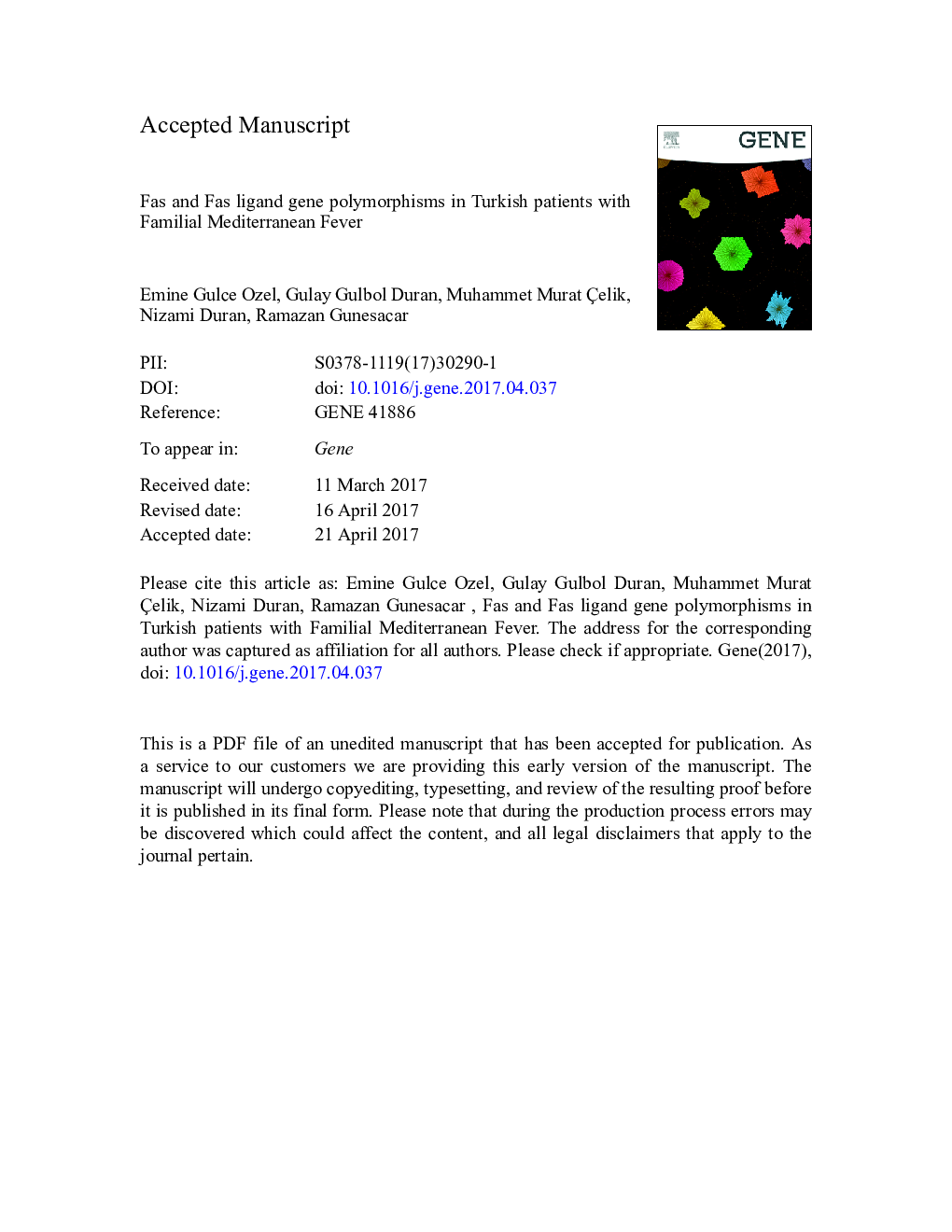| کد مقاله | کد نشریه | سال انتشار | مقاله انگلیسی | نسخه تمام متن |
|---|---|---|---|---|
| 5589420 | 1569813 | 2017 | 16 صفحه PDF | دانلود رایگان |
عنوان انگلیسی مقاله ISI
Fas and Fas ligand gene polymorphisms in Turkish patients with Familial Mediterranean Fever
دانلود مقاله + سفارش ترجمه
دانلود مقاله ISI انگلیسی
رایگان برای ایرانیان
کلمات کلیدی
موضوعات مرتبط
علوم زیستی و بیوفناوری
بیوشیمی، ژنتیک و زیست شناسی مولکولی
ژنتیک
پیش نمایش صفحه اول مقاله

چکیده انگلیسی
Familial Mediterranean Fever (FMF) is an autosomal recessive autoinflammatory disorder characterized by recurrent fever, serositis, abdominal pain, arthritis, arthralgia and erysipelas like erythema. Fas and Fas ligand molecules play a central role in the apoptosis signaling of various cell types including neutrophils. Neutrophils are the major cell population involved in acute inflammation in patients with FMF and the role of Fas and Fas ligand molecules in this cells of FMF patients may be crucial. Therefore, in the present study, we aimed to investigate whether the Fas cell surface receptor gene (FAS); NM_000043.5: c.-671AÂ >Â G (rs1800682, MvaI) and Fas ligand gene (FASLG), NM_000639.2: c.-844CÂ >Â T (rs763110, BsrD1) functional polymorphisms in patients with FMF and their relation to the main clinical features of the disease. The polymorphisms in the promoter regions of FAS c.-671AÂ >Â G and FASLG c.-844CÂ >Â T were investigated in 97 non-related FMF patients and 70 non-related healthy controls by using PCR-RFLP technique. The frequencies of FAS c-671AG genotype and G allele were not significantly different between FMF patients and healthy subjects. The frequency of FASLG -844TC genotype was found significantly different between the patients with FMF and healthy controls whereas T or C allele frequency was not significantly different between the groups. Haplotype frequencies of the studied polymorphisms were also not significantly different between FMF patients and controls. There were no correlations between the studied FAS c.-671AÂ >Â G and FASLG c.-844CÂ >Â T polymorphisms and the main clinical features of FMF such as fever, arthritis, abdominal and chest pain, arthralgia and erysipelas-like erythema. Our findings suggest that FAS c.-671AG genotype or G allele and FASLG c.-844 allele are not to be a risk factor, whereas FASLG c.-844TC genotype may be protective in the studied Turkish population. According to our results we may suggest that although not statistically significant, higher frequencies of FASLG c.-844CC genotype in FMF patients may be related to delayed apoptosis of neutrophils and ultimately cause neutrophilic inflammation by increasing FASLG expression.
ناشر
Database: Elsevier - ScienceDirect (ساینس دایرکت)
Journal: Gene - Volume 623, 5 August 2017, Pages 29-32
Journal: Gene - Volume 623, 5 August 2017, Pages 29-32
نویسندگان
Emine Gulce Ozel, Gulay Gulbol Duran, Muhammet Murat Celik, Nizami Duran, Ramazan Gunesacar,